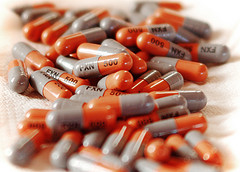 Eleven nonprofit organizations and three professors have requested that the UN Special Rapporteur on the Right to Health, “issue an urgent appeal” to the governments negotiating the Trans Pacific Partnership. The request alleges that the proposed intellectual property provisions “threaten and violate the rights of hundreds of millions of persons to the enjoyment of the highest attainable standard of health.” It suggests remedies, including making the negotiating text public, and ensuring that “no party should be bound by any provision that is in conflict with providing access to medicine for all.”
Eleven nonprofit organizations and three professors have requested that the UN Special Rapporteur on the Right to Health, “issue an urgent appeal” to the governments negotiating the Trans Pacific Partnership. The request alleges that the proposed intellectual property provisions “threaten and violate the rights of hundreds of millions of persons to the enjoyment of the highest attainable standard of health.” It suggests remedies, including making the negotiating text public, and ensuring that “no party should be bound by any provision that is in conflict with providing access to medicine for all.”
Original Documents:
The following excerpt shows six specific reasons for the complaint:
1. The agreement is being negotiated in secret, without the opportunity for the persons who will be affected by the norms to participate effectively in democratic processes to influence the outcome of the negotiations. In this regard, we note that the lack of access to information is quite unequal, and some corporate interests have special access to information about the negotiations that is not available to the general public.
2.The agreement is taking place in an environment where one country, the United States, has far more power in the negotiation than other countries, and indeed, has deliberately designed this negotiation to maximize its unequal bargaining power, in part by avoiding more transparent and equal multilateral trade forums.
3.The United States has already made proposals that would require the parties to the negotiation to adopt levels of patent protection that exceed that which is required by the WTO TRIPS Agreement, and higher than the standards that developing countries “should” adopt, in order to promote access to medicine for all.
4.The United States is expected to propose, with possible support from Australia, a set of demands regarding the use of exclusive rights in regulatory test data, linkage between patent status and drug registration and the extension of patent terms, that will exceed WTO obligations for patent protection, and are counter to the obligation in Paragraph 4 of the Doha Declaration on the TRIPS Agreement and Public Health to implement TRIPS obligations in a manner supportive of WTO members’ right to protect public health and, in particular, to promote access to medicine for all.
5.The new obligations on intellectual property protection for medical technologies will make it less likely that developing countries will elect to provide legal guarantees of universal access to medical care, including new medicines, or that they can sustain and implement obligations they have already made.
6.There are also important errors of omission in the TPP. Based upon what is known about the text of the TPP so far, it does not include obligations for trading partners to act collectively to positively address well known development concerns. The parties negotiating the TPP have obligations under the UN Declaration on the Right to Development “to co-operate with each other in ensuring development and eliminating obstacles to development.” Apparently missing from the TPP are obligations to support funding for global AIDS programs, to make investments in priority medical research and development, or to share access to government funded research – all topics that could and should be a subject of international cooperation and binding agreements.




